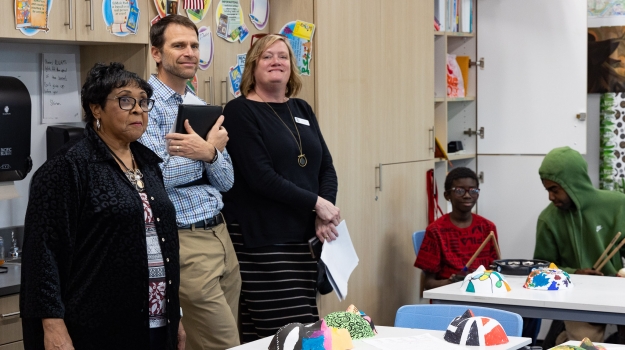The attached link to a Frontline program on middle school is worth the few minutes it takes to view it. Before you watch it, consider this story of one young girl in New York City as translatable to a young girl in Buncombe County NC. Imagine a young girl living sometimes in a local shelter, other times with different relatives, trying to figure out how to get back to her school each day even though she is in a different part of the of county, walking, figuring out the city bus schedule, and in general having a chaotic home life.
http://www.pbs.org/wgbh/pages/frontline/education/dropout-nation/middle-school-moment/
We can take a story like this and place it right here at home. Children everywhere have those kinds of struggles. Those schools that successfully connect middle school youth to an adult helper are offering lifelines to those youth. We need more of those. But schools aren’t the only places for kids to find caring adults. If afterschool programs, neighborhood centers, and faith communities take the time to connect good caring adults with kids who are having these kinds of struggles, and if those adults help them with school and home issues, then all our 6th graders could get the support they need to move into high school ready for success.
4 Warning Signs of 6th Graders Who Might Not Graduate from High School
Robert Balfanz of Johns Hopkins University conducted research to identify the warning signs in middle school that lead to dropping out of high school. Any one of these factors will increase the chances of dropping out.
1. Less than 80% attendance
2. Failing math
3. Failing English
4. Unsatisfactory behavior in a core class
Balfanz states: “It is during the middle grades that students either launch toward achievement and attainment, or slide off track and placed on a path of frustration, failure, and, ultimately, early exit from the only secure path to adult success. This essential path is leaving high school prepared for post-secondary education and career training.” (Putting Middle Grades Students on the Graduation Path, June, 2009)
Described as a “sense of shepherding”, when youngsters feel supported in their school efforts, they are more inclined to stay there and to stay engaged. Read his study for more details and suggestions on what to do.
http://www.amle.org/portals/0/pdf/research/research_from_the_field/policy_brief_balfanz.pdf
When I get passionate about an issue, it’s because I’ve been touched by a particular story and then the research about that issue. The more I learn and hear about middle school students, the more I care about what happens in those middle school years. It is hard to have a decent income, access to healthy living and an overall good life without completing high school and middle school sets the stage.


